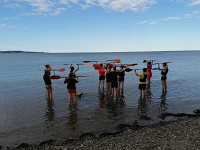ITF and Slovenia's Development Cooperation
The Government of the Republic of Slovenia is among major ITF donors. With regular yearly donations for ITF projects it has contributed more than 16,3 million EUR out of which over 8,2 million EUR was contributed through the Ministry of Foreign and European Affairs. Between 2025 and 2027, an additional amount of 4,234,000 EUR is allocated for the following projects:
- Mine Action in Ukraine in 2025 and 2026 (more information)
- Mental Health and Psychosocial Assistance to Children and Their Families in Ukraine (more information)
- Medical Rehabilitation of victims of the Armed Conflict in Ukraine (more information)
-
Humanitarian Demining Training in Ukraine (more information)
- Support to Mine Detection Centre (MDC) Polyclinic in Kabul, Afghanistan (more information)
- Assistance to People of Gaza and West Bank in Building Capacities in the Field of Comprehensive Rehabilitation and Mental Health for Victims of Conflicts (more information)
- Beekeeping as Empowerment Tool For People With Disabilities – Phase 3 (more information)
- Mine Action Activities in Bosnia and Herzegovina (BiH) in 2023 and 2024 (more information)
- Explosive Remnants of War Clearance in Iraq (more information)
- Addressing the Needs of Vulnerable Communities in the Aftermath of NW Syria Earthquake (more information)
- Supporting Conflict-Affected Communities in Northeast Syria (more information)
- Addressing the Needs of Vulnerable Groups in Lebanon (more information)
- Medical and Psychosocial Assistance to Ukrainian Refugee Children in Moldova (more information)
- Psychosocial Rehabilitation of Armenian Children - Victims of Armed Conflict in Nagorno Karabakh (more information)
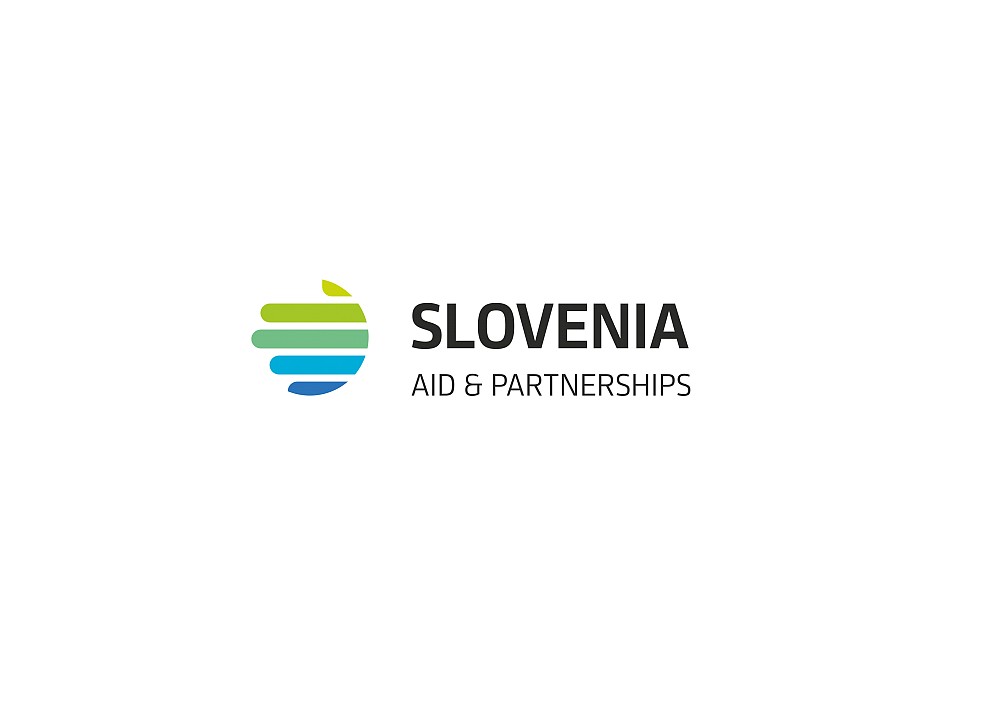
Click here for more information and insights on Slovenia's Development Cooperation programs.
Mine Action in Ukraine in 2025 and 2026
The active continuation of the ITF office in Kyiv will allow the ITF to be present as an actor in the field of mine action and mine victim assistance in Ukraine until the end of 2026. The latter will also allow for cooperation with the SESU and other authorities during the war situation for the implementation of project activities, supervision of the implementation of all project activities and the potential expansion of ITF projects in the field of mine action and victims assistance. In addition, University Rehabilitation Institute of Republic of Slovenia (URI-Soča) experts will prepare a training programme for medical staff from Ukraine, with the aim of strengthening their knowledge and local capacities. The trainings will be tailored to the needs of Ukrainian medical staff, where it is planned to conduct 10 workshops of 250 participants. The training will be delivered remotely, but if the security situation permits, also in person.
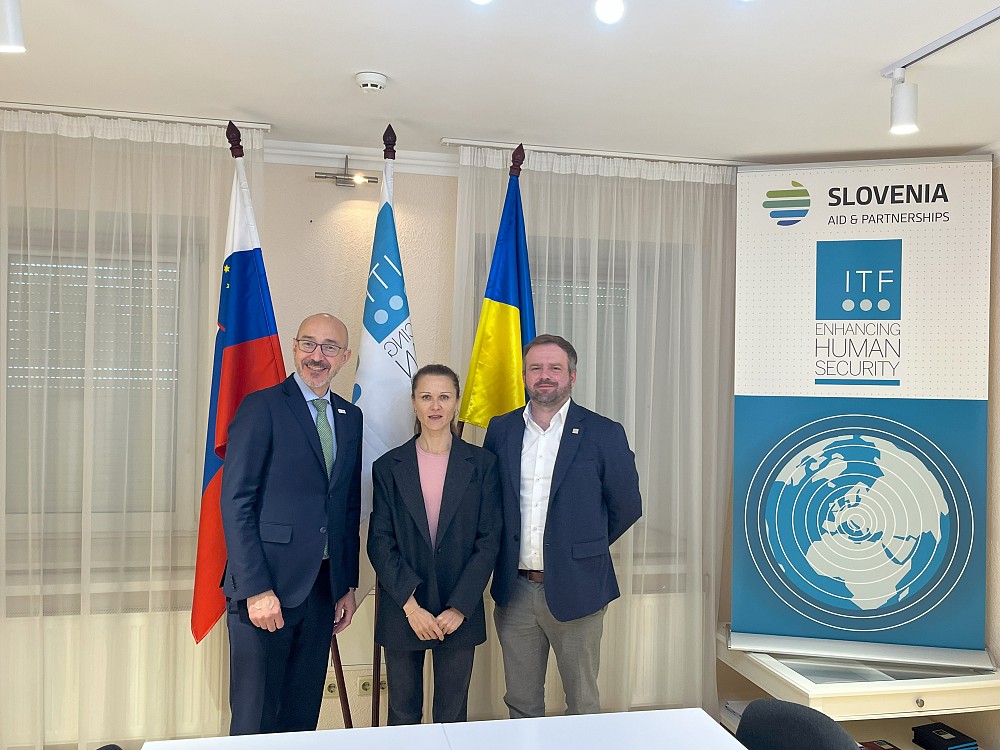
Mental Health and Psychosocial Assistance to Children and Their Families in Ukraine
In the light of the war in Ukraine, there is an increasing need to build psychological resilience and support children who have suffered losses and traumatic experiences. The permanence of armed conflict contributes to increased vulnerability to mental wounds and problems. ITF has already implemented the Mental Health and Psychosocial Support for Children and their Families project in 2023-2024, together with partners Slovenian Philanthropy and the Ukrainian NGO Zhiva-Ya. The implemented project proved to be very appropriate and relevant to the local context; it was well received by Ukrainian stakeholders - MHP experts, teachers, children and parents - and was successfully implemented. It has contributed significantly to local capacity building - increasing knowledge and mobilising social and human capital in communities in strategic and organisational terms. One of the essential features and strengths of the implemented project, which is embedded in the school and the community, is that it provides the necessary support to many children by supporting natural coping and recovery processes. It enables the provision of essential psychosocial support to children in school and the mobilisation of the school and its environment for the psychosocial protection of children. It represents a sustainable model of school-based psychosocial support for children that will be necessary and feasible in post-war situations.
The aim is to provide mental health protection and psychosocial support (MHPSA) to children and their parents in the Izmail and Odesa regions, building on the school and community-based model of mental health protection and support for children that was successfully launched in the previous pilot project. In addition, a volunteering centre will be established.

Medical Rehabilitation of Victims of the Armed Conflict in Ukraine
ITF buids upon the cooperation with Superhumans Center in 2025 and 2026. At least 20 victims of the armed conflict in Ukraine will receive medical rehabilitation in cooperation with the Superhumans Centre in Ukraine, including medical treatment, screening to determine the actual situation, triage, rehabilitation and medical equipment. Rehabilitation of all victims of conflict requires a sustainable and holistic approach to rehabilitation, which entails both physical and psychological support. Selected victims of the armed conflict in Ukraine will be provided with improved conditions for successful reintegration into society and achieving an equal position in society.

Humanitarian Demining Training in Ukraine
This project supports the sustainable integration of Ukrainian war veterans by combining certified humanitarian demining training with tailored psychological support. In response to the challenges of widespread landmine contamination and veteran unemployment, project activities will equip 40 veterans with nationally recognised demining skills and strengthen resilience and mental health. The project promotes peacebuilding, decent work (SDG 8) and mental well-being (SDG 3). Through comprehensive training cycles, job placement support and public awareness raising, it creates a skilled workforce to clear contaminated land, restore safe living conditions and promote social inclusion. The project also ensures gender equality in access and respects international environmental standards. The project enables veterans to rebuild their lives while contributing to the country's recovery, and is thus a model for inclusive post-conflict development and resilience.
Support to Mine Detection Centre (MDC) Polyclinic in Kabul, Afghanistan
In the aftermath of ongoing wars, Afghanistan continues to be one of the world's poorest nations. A majority of its population resides in remote areas, far from medical facilities, and must undertake arduous journeys on foot, often requiring payment for essential services. This severely restricts the access of vulnerable populations to healthcare services. Health challenges in Afghanistan are closely linked to reproductive health, with an alarmingly high rate of infant mortality. Furthermore, transmitted diseases contribute to approximately half of all deaths in the country.
Slovenia has been supporting the MDC Polyclinic through ITF since 2016. It enables free healthcare support to deminers and their families as well as the population of Kabul. The care includes physiotherapeutic, gynecological, and dental services as well as examinations and consultations. During 2022, more than 51,100 physiotherapeutic, gynecological, and dental services were provided to Kabul citizens. Additionally, radiological, laboratory and pharmaceutical services were provided. The project specifically focuses on services for women and children who cannot afford healthcare.
Over the next two years, over 74,000 medical services/examinations/consultations will be provided in the fields of gynecology, internal medicine, pediatrics, orthopedics, and neurology to the most vulnerable Kabul citizens through the support of Republic of Slovenia.
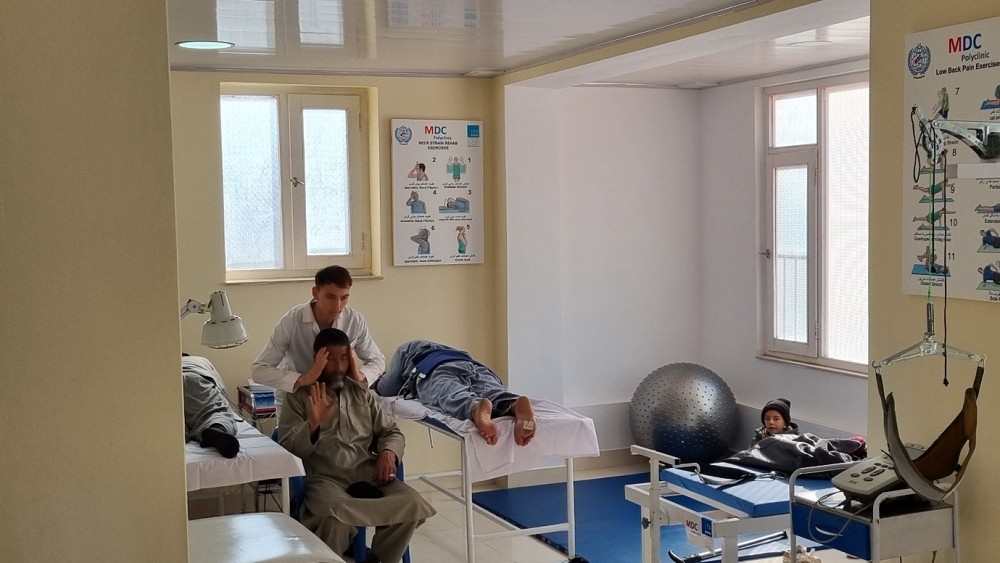
Assistance to people of Gaza and West Bank in Building Capacities in the Field of Comprehensive Rehabilitation and Mental Health for Victims of Conflicts
Since 1948, generations of residents in Gaza Strip and West Bank have been subject to repeated conflict and displacement. Thousands of civilians were injured during the conflicts, with a large majority being children and young adults, especially in Gaza Strip. Although the physical and medical rehabilitation system has been developing through the years in Gaza Strip and West Bank, injured persons, especially children, were still unable to benefit from proper treatment and the use of medical devices. Families are constantly under strain and repeated traumas without allowing the time for a proper recovery process to take hold.
The current project co-financed by the Republic of Korea, is primarily aimed at activating human resources for physical rehabilitation and psychosocial support of people in Gaza Strip and West Bank. It will contribute to the professional skills of experts in physical medicine and rehabilitation and educate and empower them for providing psychosocial support to their clients. In addition, it will activate resources for assistance to children and other persons in need by educating and empowering mentors - school teachers and NGO workers for development of voluntary work of youth and implementation of school based and community based voluntary activities of youth.
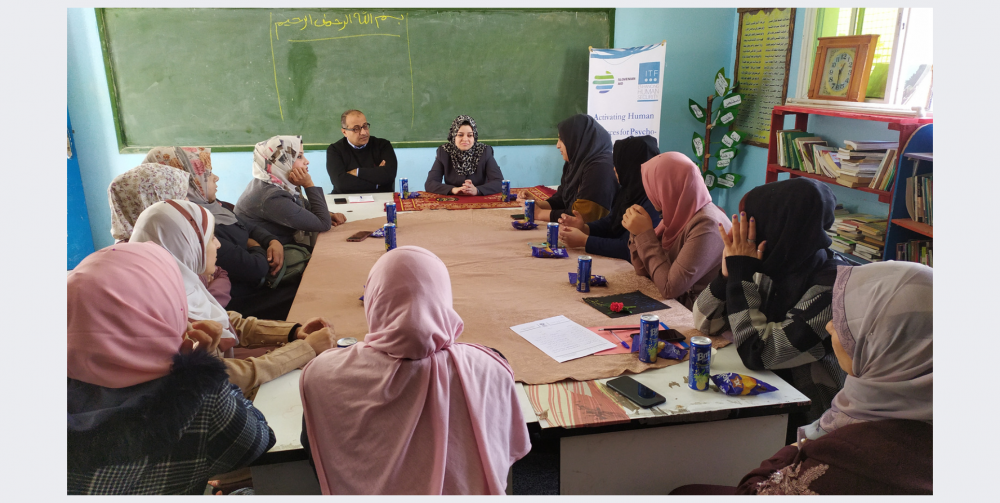
Beekeeping as Empowerment Tool For People With Disabilities – Phase 3
Beekeeping is an excellent way to establish a steady household income and improve the quality of life for vulnerable social groups, including mine victims. It requires a small initial investment and does not rely on complex technologies to get started. Local materials can be used, making it accessible to everyone. Beekeeping is particularly suitable for small-scale agricultural activities in areas with limited capital and technological resources. This can support disabled individuals to find employment opportunities through beekeeping, as it can be done from home.
In 2021 and 2022, ITF implemented these activities with the goal of empowering mine victims from BiH and Due to the requests from the participants the project will continue in 2023 and 2024.
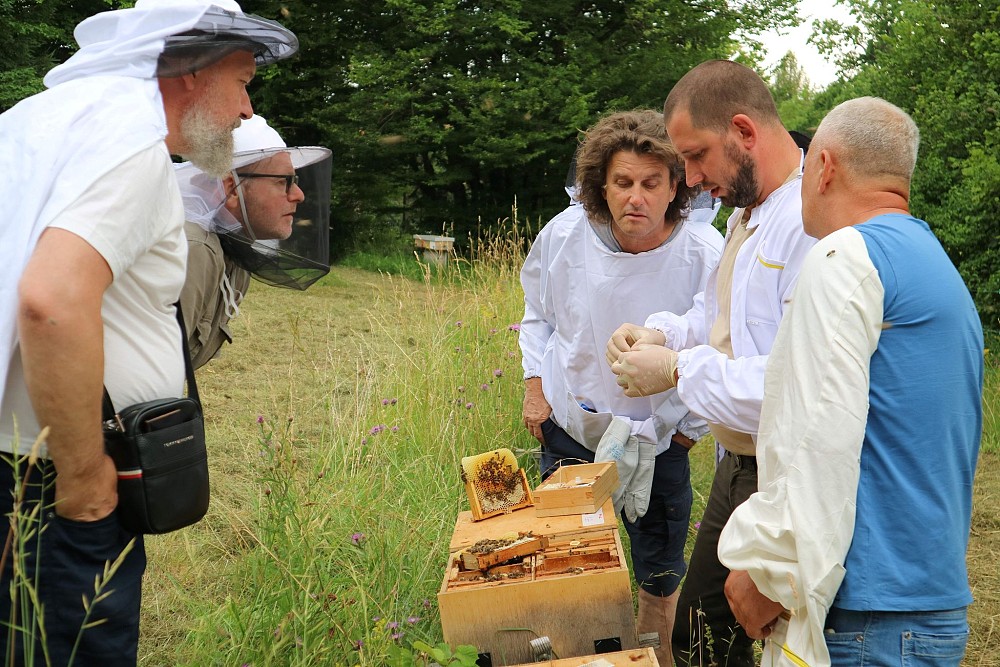
Mine Action Activities in Bosnia and Herzegovina (BiH) in 2023 and 2024
Bosnia and Herzegovina (BiH), faces the persistent issue of mines and UXO, hindering socio-economic development even after 25 years since the end of armed conflicts. ITF operates in BiH with the objective of effectively implementing mine action projects aligned with BiH's strategy, ensuring personal safety, and promoting sustainable development.
From 1996 to 2022, ITF, with support from the international community and the Republic of Slovenia along with the BHMAC and other actors, successfully reduced mine-suspected areas in BiH from 4,200 km2 to 869 km2. Through ITF, about 120 km2 of territory have been inspected, demined, and made safe, uncovering around 42,000 mines/UXO in approximately 2,700 locations. Additionally, 972 mine/UXO victims have been rehabilitated, over 180,000 individuals were educated about landmines, and more than 5,000 mine victims received socio-economic assistance.
During the period of 2023 to 2024, the project aims to inspect and clear approximately 8 km2 of mine/UXO-contaminated territory. It also includes implementing activities of assisting mine victims, rehabilitation, raising awareness, and providing support for structures, equipment, and training, depending on donor funding.
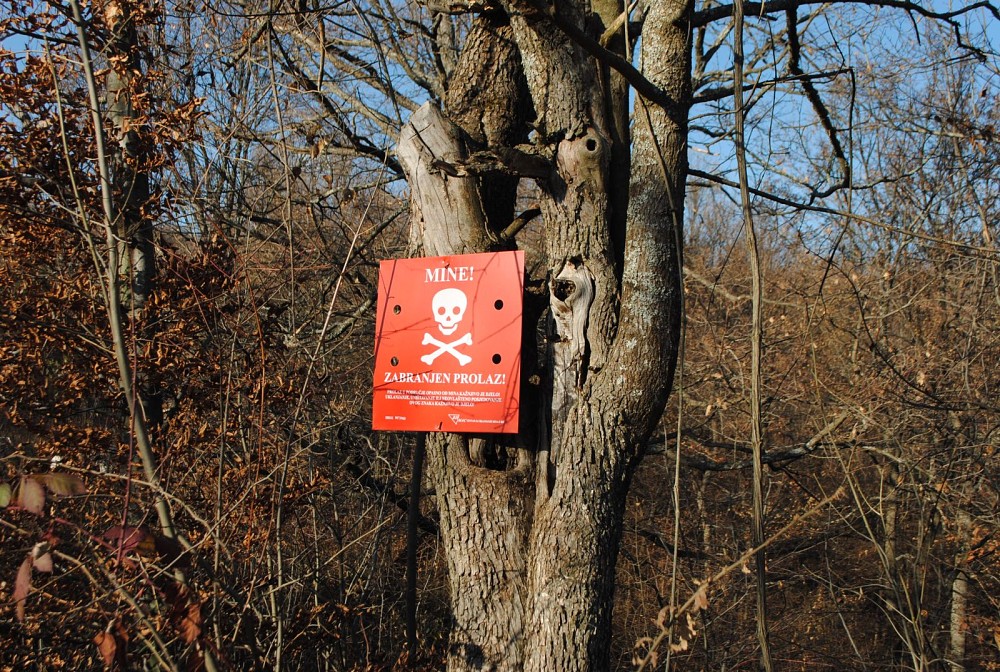
Explosive Remnants of War Clearance in Iraq
After decades of wars, Iraq is facing extensive contamination by Explosive Remnants of War (ERW). The northern region of Iraqi Kurdistan is particularly affected by so-called legacy contamination which originates from the period before 2014, with over 260 km2 of land contaminated, impacting more than 600 communities. ERW poses a significant danger, hindering agriculture, socio-economic activities, aid delivery, and basic infrastructure. Despite being a signatory to the Convention on the Prohibition of Anti-Personnel Mines, Iraq struggles to meet clearance deadlines due to limited resources, especially in Iraqi Kurdistan. With this project, ITF supports the logistics and transportation of demining teams, enabling the return to work of at least 20 demining teams. These teams will operate in four provinces in the highest priority areas of Iraqi Kurdistan in line with Iraq's strategy in mine action.
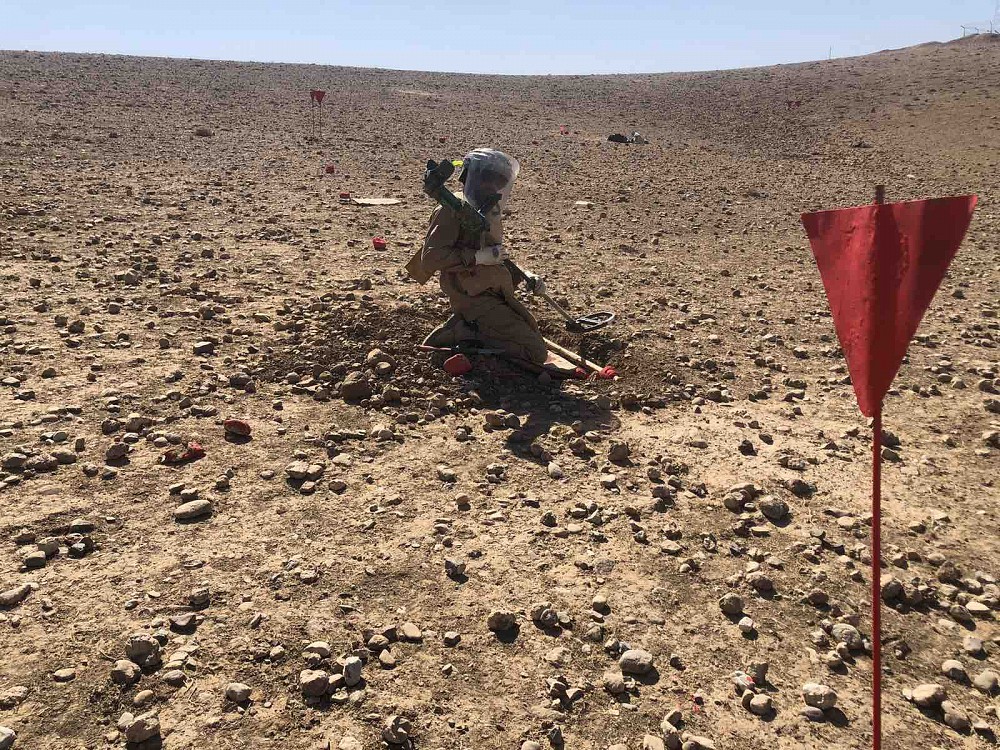
Addressing the Needs of Vulnerable Communities in the Aftermath of NW Syria Earthquake
On February 6th, 2023, a major earthquake struck multiple areas of northwest Syria, with smaller-scale tremors also affecting parts of northeast Syria. The earthquake caused extensive damage and displacement, exacerbating the ongoing humanitarian crisis in the region. The project addresses the urgent needs of vulnerable communities and individuals impacted, as it aims to provide safe shelter, non-food assistance, and supporting basic and urgent medical care. These efforts will help address the deepening humanitarian crisis and improve living conditions of communities affected by the earthquake.
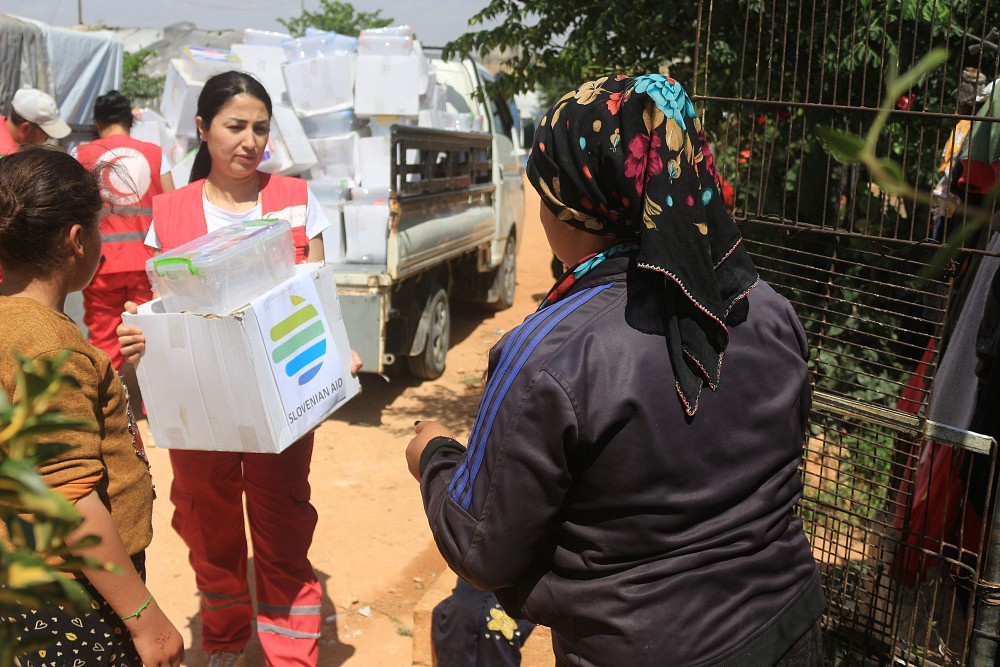
Supporting Conflict-Affected Communities in Northeast Syria
A decade since the start of war in Syria, humanitarian needs throughout the country remain highly complex, and are even increasing on account of the deepening economic crisis. This project complements and builds on the previous projects that the ITF implemented in Northeast Syria, also with the support of Slovenia and Austria, and responds to the current needs in the region. ITF aims to support the stabilization in Northeast Syria by helping improve overall security, livelihoods and food security in areas affected by explosive hazards contamination.
ITF will conduct a non-technical survey of the territory in 300 communities of Northeast Syria. Based on the analysis of data obtained through a non-technical survey of the territory, ITF, in cooperation with related organizations, will also determine priority areas for conducting awareness workshops on the dangers of explosive devices; in particular, the most polluted communities in Al Hasakah province and the most neglected communities, where the disaster is likely to be greatest, will be included. ITF is expected to reach 6,000 children and adults from the most endangered or neglected communities through awareness-raising activities about the danger of explosive devices.
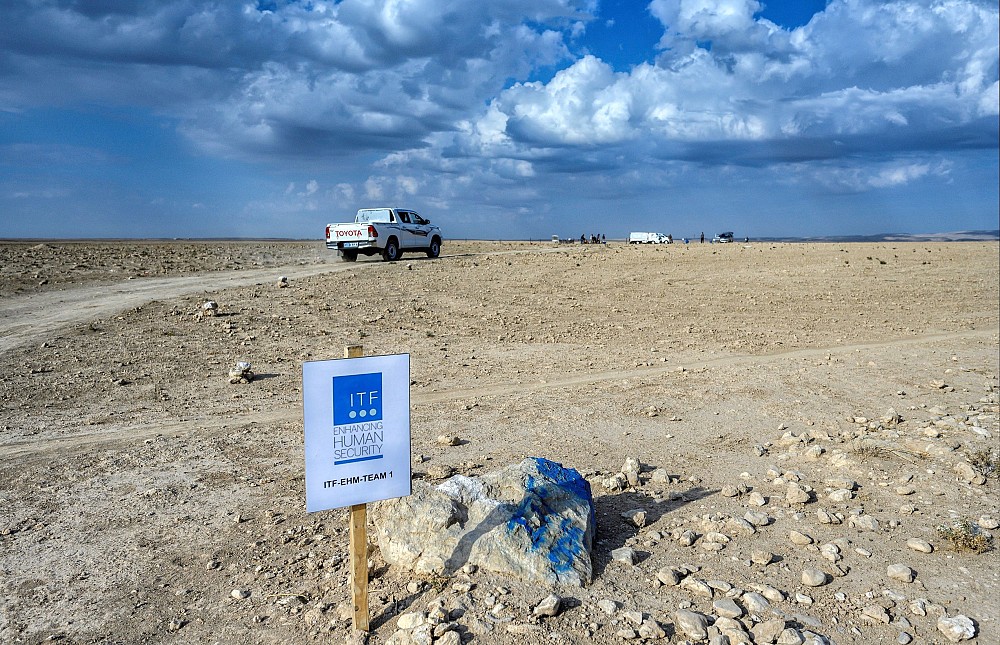
Addressing the Needs of Vulnerable Groups in Lebanon
The Syrian crisis has substantially increased Lebanon's population, contributing to the already severe socio-economic situation and putting serious pressure on already overburdened public services and host communities, including health and education services and access to employment. This situation was further exacerbated by the COVID-19 pandemic and explosion in the port of Beirut with devastating health, psychological and material consequences. Due to a deep economic and financial crisis the poverty rates are increasing and combined with the growing costs of living, access to basic services like health and education became almost impossible causing the need for support of vulnerable groups to be immense. In addition, mine contamination in the country has had serious consequences for the health and well-being of the population. Mine victims urgently need long-term assistance, but funding for medical, psychosocial and socio-economic rehabilitation is scarce and the needs are high (LMAC).
Furthermore, recent years have shown a surge in mine victims caused by increased risky behavior due to increasing economic pressure – people are knowingly entering marked minefields in order to gather wood for heating or scrap metal.
The project is a continuation of the project activities funded by the Republic of Slovenia in Lebanon in 2021-22 and addresses the urgent health, psychosocial and economic needs of 102 mine victims in Lebanon to help improve the overall quality of their lives and facilitate their reintegration into social, political, and economic life.
Medical and Psychosocial Assistance to Ukrainian Refugee Children in Moldova
Due to the hostilities on the territory of Ukraine, there is a growing number of refugees located in the border areas between Moldova and Ukraine - mostly children and their mothers. The population crossing the border nowadays is significantly more traumatized and in a poor economic situation. In addition to health problems, including severe lack of medicines, children and their mothers are burdened with psychological trauma caused by war, and experiencing personal anxiety caused by their refugee status. Moldova is the poorest of all refugee-receiving countries and has the least potential to provide the necessary medicines and basic psychosocial protection for children and support for their mothers. In total, almost 750,000 Ukrainian refugees have entered the Republic of Moldova in the last 11 months, and more than 102,000 are still present there – almost half of them are children. Therefore, ITF decided to provide assistance by supplying medicine for children and their mothers and to organize daily activities for children that will alleviate the psychological consequences of armed conflict and their status. Psychosocial activities support mothers in their daily functions by alleviating their traumas and losses.
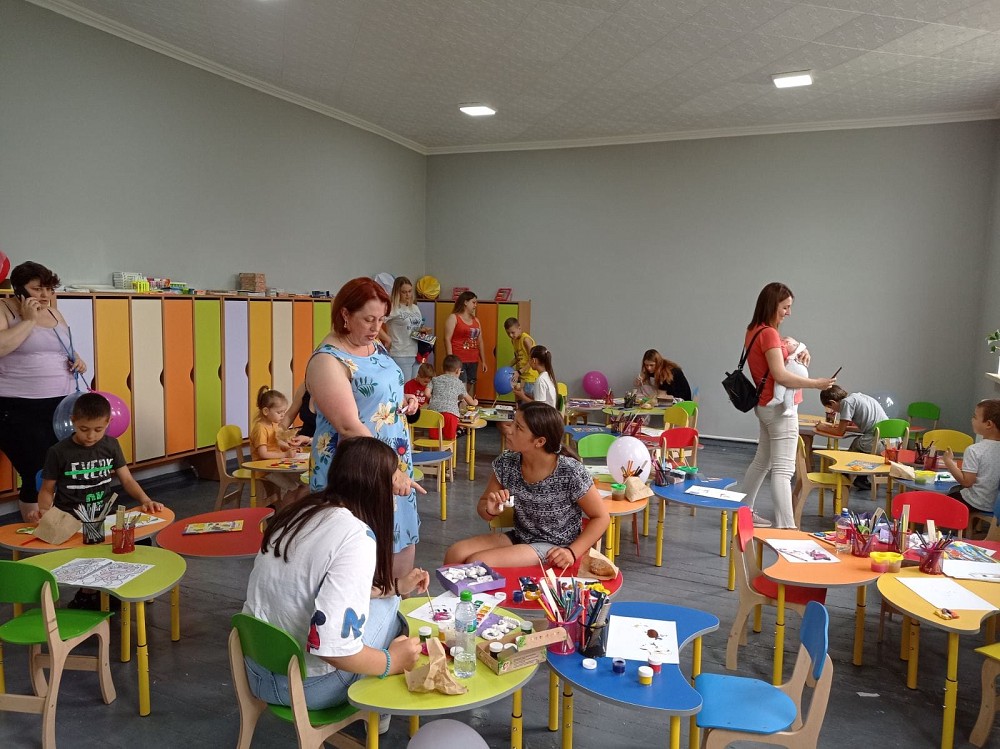
Psychosocial Rehabilitation of Armenian Children - Victims of Armed Conflict in Nagorno Karabakh
In 2023, 12 children, victims of armed conflict, will participate in psychosocial rehabilitation in Slovenia. The goal of the project is to enable children adequate medical rehabilitation carried out by Slovenian Red Cross Health and Youth Resort Debeli Rtič. The comprehensive rehabilitation program will cover various therapies and other activities – hydrotherapy, respiratory physiotherapy, exercises for persistence, and a rich educational and social gathering program. This psychosocial program is planned to continue in 2024.
